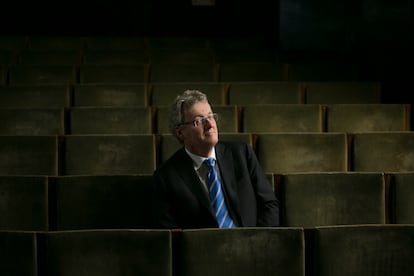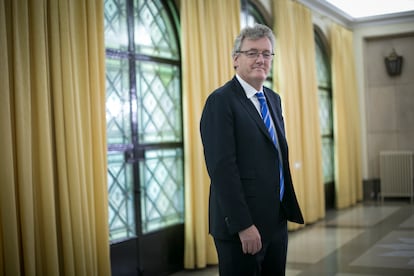David MacMillan, Nobel laureate in Chemistry: ‘I believe in science. In the end, it will provide solutions to climate change’
The researcher designed a new method to make safer drugs and more sustainable chemicals and proteins

The day they explained enantiomers, David MacMillan didn’t go to class. He was watching a soccer match between Scotland and Cyprus. His professor at the University of Glasgow told him off, because enantiomers are important. “I didn’t know,” the 55-year-old self-proclaimed soccer fan laughs.
In 2021, the now-professor at Princeton University received the Nobel Prize in Chemistry for the development of asymmetric organocatalysis — an ingenious and selective way of building these types of molecules, which are identical, but symmetrical, as if they were reflected in a mirror.
Until just over 20 years ago, in the production of drugs or chemical products for industry, metals, or enzymes, proteins such as enantiomers — which allow us to digest — were used as catalysts to accelerate chemical reactions. But metals can be contaminants and enzymes are very complex. Furthermore, many of the chemical processes generated pairs of mirror molecules, of which only one of the two was useful. Although they seem almost the same, they can have very different effects on the body. Thalidomide is a dramatic example of these differences: one of the enantiomers relieves nausea in pregnant women, but the other — produced as an inseparable byproduct — can generate deformities in babies.
MacMillan and Benjamin List developed new methods to achieve the reactions caused by enzymes, while using only a small part of those large proteins that are involved in catalysis. MacMillan discovered many organic catalysts capable of producing only the desired enantiomer, without generating the undesired symmetrical molecule. Asymmetric organocatalysis has since become a way to make chemistry less dangerous and more sustainable.
In an interview with EL PAÍS conducted at the Royal Academy of Sciences in Madrid, the researcher highlights the importance of the Scottish public education system as the basis for the scientific success of his country. With only five million inhabitants, it has more Nobel Prize laureates than Spain, a country of 48 million people. Scots have won 16 Nobel Prizes in total. To improve the figures in other countries, he recommends investing in education. “You’ll see a big change in maybe 20 years.”
Question. The idea for which you were awarded the Nobel Prize seems simple. Perhaps it should have occurred to someone earlier?
Answer. We did something that seemed very simple, but no one had thought of it before. I thought: “If it’s so simple, why hasn’t anyone seen it?” But I think this happens a lot in all parts of society. We put a man on the Moon before we put wheels on a suitcase! Oftentimes, the simplest solutions are right in front of us, but we don’t see them. We have to take a step back and think about why we’re doing what we’re doing. And, suddenly, you see it — and that’s the fun part in all of this. [You see] that science is going in one direction, but there are [other paths] that haven’t been taken that are important and simple.
This happens because we’re human. We think that science is absolute and perfect, but we’re really just humans doing science — there are a lot of things waiting to be discovered. When you’re on the frontier of science, one of the best things is realizing how much there is to discover. It’s very exciting. Like, when you bring an 18-year-old student to the laboratory and you ask them to make a molecule, you tell them: “No one in the universe has made this molecule before.”
Q. To make great discoveries, you first have to know a lot about a field… but you also have to have a certain naïveté to be able to think differently. How does one achieve this combination?
A. The most dangerous thing is knowing a little, because when you know [too] little, you think you know everything. The more you learn, the more you realize how much we don’t know… which is [a huge amount]. Naïveté is very good, perhaps the most important thing. The Beatles, McCartney and Lennon invented new guitar chords that no one had heard before. When they were asked how they had done it, they said: “We didn’t know they weren’t known.” And so, sometimes, not knowing things is really, really powerful, because you don’t know that they shouldn’t work.
A lot of times, I give a project to a completely new student in my group, because they haven’t developed the idea that it shouldn’t work. Once someone believes that something isn’t going to work, it’s very difficult for them to find the motivation, determination and creativity to make it work.

Q. Has winning the Nobel Prize taken away some of your naïveté? Is it a prize that makes it difficult to make new discoveries?
A. I always tell my students that the first person you have to impress is yourself. And when you win a Nobel Prize, you go to sleep happy… so you lose a little of that need to be impressed. You have to work to get it back. But, at the same time, when you win the Nobel, people decide that you’re much smarter than you really are. The benefit of that is, when you talk to people in government, to politicians, you can explain to them why things are important and they’re much more likely to listen to you.
Q. Scientific progress has made it increasingly difficult to understand some of what happens at the frontier of knowledge. This complexity is likely to make more people distrust science. Can something be done so that society doesn’t perceive science as being esoteric and scary?
A. It’s interesting that all the people who are skeptical of science comment on it and make opinions about it on social media. They’re using science to complain about science! They forget that everything around them is based on science. But I think [your point] is correct: because it’s getting more complicated, it’s getting further and further away from what people can understand. And once people don’t understand, it’s harder for them to accept. It’s easy to explain the science of boiling water in the pot, because you can see it, you feel it… but if someone tells you about quantum computers, that’s something else entirely.
But the problem we face isn’t that science is becoming more complex: it’s that scientists are [struggling] to explain what we’re doing to society, why we’re doing it and why it’s important. We’ve lost the ability to communicate, even between scientists from different fields, because [it’s like we’re speaking] totally different languages. It’s a problem. If we don’t spend time thinking about how to communicate [our ideas to people], we lose everyone.
Q. Do you think that a big problem like climate change can be solved thanks to science, even if we’re not able to change our way of life to reduce emissions?
A. Yes. I’m a born optimist. I always think there are solutions. There’s a problem in my laboratory, which we tried to solve for 17 years. One day, we solved it. You can stare at a problem for 17 years and then bang, the light bulb goes off. I believe in science strongly and I do believe that there will ultimately be solutions to climate change.
Now, there are many scientists who would disagree with me, and they would actually say it’s maybe dangerous to say that science will solve it, because you’ll lower the motivation to care. I don’t want to lower people’s motivation to care. But humans are incredibly impressive at solving things. I do believe that, at some stage, with so many people worried about the problem and trying so many different things, a solution will eventually appear. That’s my belief.
Q. Are there specific tracks of research that are honing in on these solutions?
A. There are two. One is about how to convert solar energy into chemical bonds. With electricity, we use capacitors to store it, but we don’t have capacitors good enough to store all the energy the world needs. One way to do this is to convert molecules that have low energy into things that have high energy. For example, if you were to take water and convert it into hydrogen and oxygen, we know that hydrogen and oxygen are combustible and they give off energy when they go back to water. So, if you can convert water to hydrogen and oxygen — which people have been trying to do for a long time — you’ve stored all that energy in chemical bonds. [Scientists] are now spending a lot of time thinking about that.
The other thing is what’s called the mineralization of carbon dioxide. And there’s a realization that we have all of these elements, which are all over the earth — like sodium, caesium, magnesium — which can actually capture carbon dioxide to form minerals. The problem is that it takes thousands of years for that to happen. We don’t have thousands of years. So what do we need? We need a catalyst to shorten thousands of years to half-a-day, one day, or two hours.
Sign up for our weekly newsletter to get more English-language news coverage from EL PAÍS USA Edition
Tu suscripción se está usando en otro dispositivo
¿Quieres añadir otro usuario a tu suscripción?
Si continúas leyendo en este dispositivo, no se podrá leer en el otro.
FlechaTu suscripción se está usando en otro dispositivo y solo puedes acceder a EL PAÍS desde un dispositivo a la vez.
Si quieres compartir tu cuenta, cambia tu suscripción a la modalidad Premium, así podrás añadir otro usuario. Cada uno accederá con su propia cuenta de email, lo que os permitirá personalizar vuestra experiencia en EL PAÍS.
¿Tienes una suscripción de empresa? Accede aquí para contratar más cuentas.
En el caso de no saber quién está usando tu cuenta, te recomendamos cambiar tu contraseña aquí.
Si decides continuar compartiendo tu cuenta, este mensaje se mostrará en tu dispositivo y en el de la otra persona que está usando tu cuenta de forma indefinida, afectando a tu experiencia de lectura. Puedes consultar aquí los términos y condiciones de la suscripción digital.









































